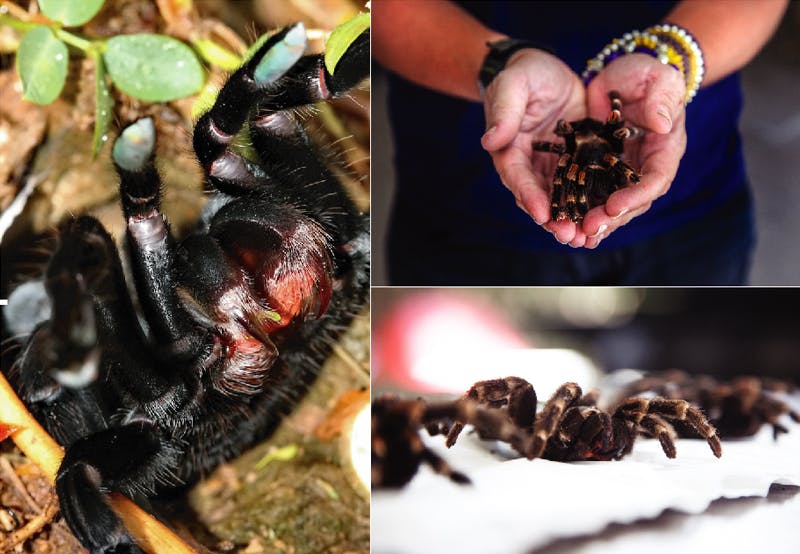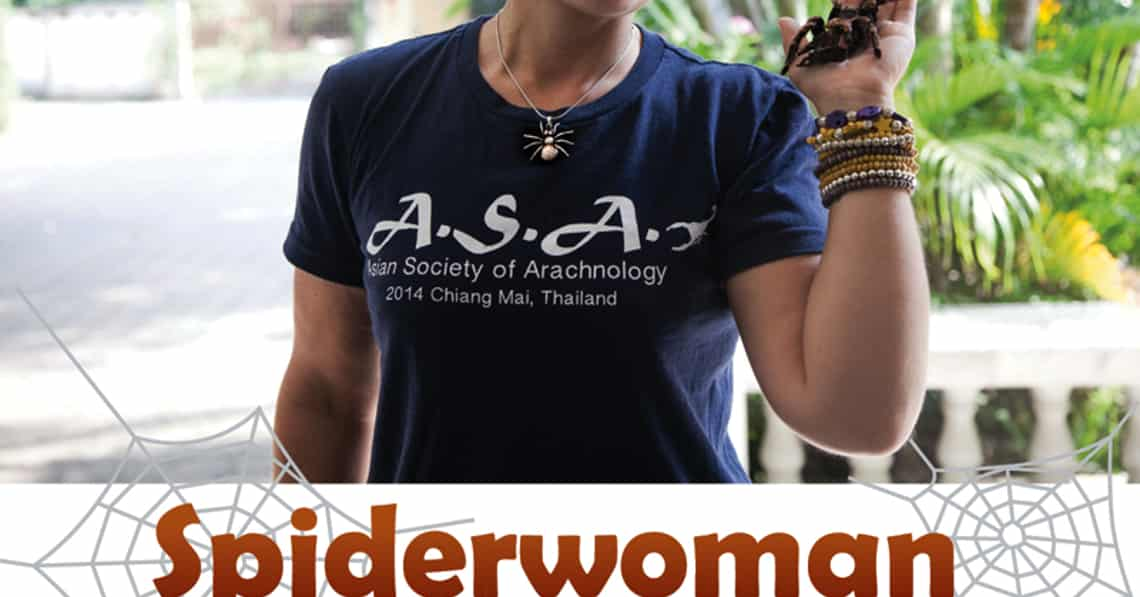Dr Emma Shaw, 38, is a British expert on spiders. She came to Citylife’s attention when she refuted claims that deadly brown recluse spiders were on the loose in northern Thailand. Now she’s on the lookout for a population of tarantulas to further her research. “I don’t want anybody to collect them; I just want to know where they are,” she tells me.
When I meet Shaw for a cup of tea in a noisy school canteen one afternoon, she’s sporting a large silver spider necklace and I’m surprised to learn that she hasn’t always been so fond of these eight-legged creatures. “I hated spiders as a kid. It was my granddad who stopped me being scared of them and used to make me hold them.” Shaw later went on to work for the Royal Society for the Protection of Birds while doing her undergraduate degree. “I spent three months working for them and I lived on site at one of their reserves and did my data collection for my final year dissertation. As I was doing that I just kept seeing these amazing spiders and got really interested in them.” The summer after, the unstoppable Shaw went on a research trip and met an arachnologist who suggested she do her project on spiders. “I spent two entire weeks looking at one species of spider and I was totally hooked. I left there and said ‘I want to do a PhD on spiders.'”
Shaw was looking to permanently leave the UK when she came to Thailand on holiday and fell in love with the country; Chiang Mai, especially. She came back in 2010 to look for a job, got employed by Chiang Mai University, and never went home. She’s been teaching at Prem Tinsulanonda International School for the past two years.
In 2012, Shaw helped found the Asian Society of Arachnology (ASA). “A few of us had got together and realised there are many arachnological societies around the world but there isn’t one for Asia. So there wasn’t really anything that was bringing all the Asian societies together to have something that was a bit more collaborative,” she recalls.
Shaw hopes to help combat the rather unfair stigma toward spiders here in Thailand. “I think that in general people are relatively misinformed and quite frightened of spiders,” she says. “I think the issue here is that there are some quite big spiders! And I think people’s immediate reaction is, ‘It’s a big spider, it’s gonna bite me, I’m gonna die!’ which actually is not the case. For most of the spiders here, their venom doesn’t have any impact on humans.”
Let’s face it, spiders don’t really get any good press. You only need to look at the latest incident of mistaken identity in Phrae, where false reports of a brown recluse bite went viral on Thai news sites countrywide. The spider in question was actually a brown widow, as the ASA confirmed, which is significantly less worrying, but the misinformation and widespread panic continued to spread.
Meanwhile, “the bad press spiders do get gets blown out of proportion,” adds Shaw. “If somebody dies from a spider bite it becomes very big news even though proportionately the people who die from spider bites is absolutely minuscule compared to anything else that may happen to you in everyday life.”
But don’t naively conclude that there is absolutely nothing to fear from our eight-legged friends here in the Land of Smiles. “I’m not prepared to say they’re not a danger to people, because it completely depends on the individual,” says Shaw. “For example, bees and wasps have no impact on me, but they can kill somebody else. So I tend to shy away from saying ‘this will have no impact on anyone.’ But the majority will have very little impact on most people.”
So what’s being done to try and shed this negative perception of spiders? Well, Shaw’s colleagues have been going into schools, often with a cuddly tarantula or two, and running workshops with young children. The kids have the option of handling the tarantulas if they want and the idea is to get them to understand spiders and stop being scared of them from a young age. Shaw also runs Bug Club for the junior school at Prem. “I talk about the variety of colours, the types of webs that they have, and the cool things that they can do. I’m finding that we’re getting more and more students that are really interested in them now. They’re often very good at then transmitting that information to their parents too.”

Indeed, there’s heaps of cool and interesting things about spiders, not least of which is that they can keep other more harmful pests away. People often ask Shaw to get spiders out of their homes. “I ask them, ‘Are you really sure? Because if I take the spiders, you will have mosquitos.'”
Another surprising advantage of spiders is that they can act as a natural form of pesticide for crops. In fact, this is what Shaw’s PhD was about. “If it was done properly and on a large scale, it could have a huge impact on the amount of chemicals that we’re putting into the system,” she tells me.
Here in Chiang Mai, Shaw is a helpful resource when it comes to specific spider identification. So, I asked her which ones we’re mostly likely to find lurking around. “You’ll find Sporacid,” she says. “These are the wandering spiders, the big ones that sit on your wall. In rainy season, they come into your house. We get one called Pholcus, which we have in the UK as well, the cellar spider – tiny little body, big spindly legs and they do this weird web-shaking thing if they get disturbed. You’ll find those in the corners of rooms. Then there’s tonnes and tonnes of different types of jumping spiders, the cute little colourful ones with the most amazing eyesight…which is why they’re not found in webs; they actively hunt their pray.” And in the garden? “Outside your house you’ll find Nephila, the very big golden silk orb-weaver, which you see in the absolutely enormous webs here.”
If you’re interested in learning more about spiders, the ASA is currently setting up its website. “We’re hoping to set some pages up that have the spiders that you need to be worried about in different Asian countries, and ones that just look like you should be worried about but are actually okay,” Shaw tells me. There’s also a book in the pipeline. “It will be a very general guide because there isn’t one for this part of the world. So we’re looking at developing that and publishing it in Thai and English in the same volume.”
Shaw is adamant that all her spider info be available in Thai too. “The kids that come to this school, some of them do live here permanently but a lot of them move in and out of Thailand and they’re not going to stay here. And that’s great they take that information with them, but the Thai people who live here, they need to know this information too. I’m hoping I might learn something from them as well. I’m quite interested in folklore and spiders and I’m sure there must be some quirky little stories that I don’t know of yet.”
So why is she looking for a population of tarantulas? “My research before I came here was in Belize in Central America, looking at tarantula behaviour, and one thing we found is that a number of tarantulas dig their own burrows that they live in. A lot of previous research thought that they mainly dug one burrow and unless something major happened they tended to stay in the same place.” Shaw mapped these tarantulas and found that this wasn’t necessarily the case. “I started micro-chipping and tracking them and looking at their movement and distribution over five years and I found that actually they move a lot and there’s a whole bunch of stuff that we have no idea about. As of yet, nobody has really developed that side of tarantula research.” Unfortunately, the research centre in Belize closed down, so Shaw had to stop her research there. “I really want to set up something similar here but I’ve yet to find an actual population where I can find more than one individual.”
If you know of a tarantula population in Chiang Mai, please email Emma Shaw at spideremma.shaw@gmail.com. They can be a wee bit aggressive so please don’t attempt to collect them. You have been warned!
